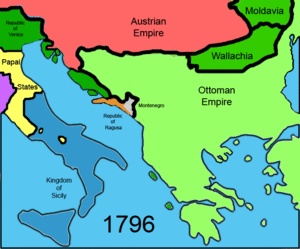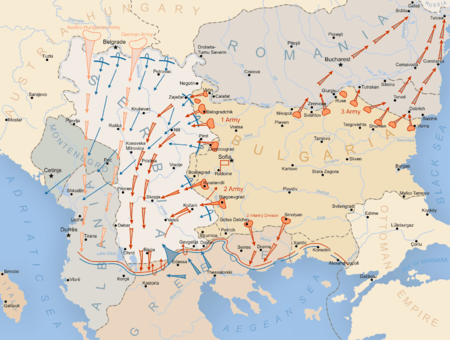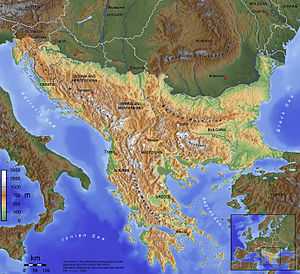Balkanization
| Look up Balkanization in Wiktionary, the free dictionary. |


Balkanization, or Balkanisation, is a pejorative geopolitical term, originally used to describe the process of fragmentation or division of a region or state into smaller regions or states that are often hostile or non-cooperative with one another.[1][2]
Nations and societies
The term refers to the division of the Balkan peninsula, formerly ruled almost entirely by the Ottoman Empire, into a number of smaller states between 1817 and 1912.[3] It was coined in the early 19th century and has a strong negative connotation.[4] The term however came into common use in the immediate aftermath of the First World War, with reference to the numerous new states that arose from the collapse of the Austro-Hungarian Empire and the Russian Empire.
There are also attempts to use the term Balkanization in a positive way equating it with the need for decentralisation and sustenance of a particular group or society. Current research on the positive aspects of Balkanization is carried out by Srđan Jovanović Weiss with Centre for Research Architecture[5] at Goldsmiths College.[6][7]
The larger countries within Europe, often being the result of the union of several historical regions or nations, have faced the perceived issue of Balkanization. The Iberian Peninsula and Spain especially has from the time of Al-Andalus had to come to terms with Balkanization,[8] with several separatist movements existing today including the Basque Country and Catalan independentism.
Quebec has been the scene of a small but vociferous partition movement from the part of anglophone activist groups opposed to the idea of Independence of Quebec. One such project is the Proposal for the Province of Montreal, which wishes for the establishment of a separate province from Quebec from Montreal's strongly anglophone Anglo-Saxon and immigrant communities.
In January 2007, regarding the growing support for Scottish independence, the then-Chancellor of the Exchequer of the United Kingdom, and later Prime Minister, Gordon Brown talked of a "Balkanisation of Britain".[9] Independence movements within Britain also exist in England, Wales, Cornwall and movement in Northern Ireland.
Other uses
The term is also used to describe other forms of disintegration, including, for instance, the subdivision of the Internet into separate enclaves,[10] However, Robert Morgus' and Tim Maurer's study suggests that the alarmist term “Balkanization” should be replaced with more appropriate terms as fragmentation and diversity.[11] The term has been used in American urban planning to describe the process of creating gated communities. Andrej Grubacic rejects the racist, colonialist conception of "balkanization" as a process by which "ancient, ethnic hatreds" lead to a process of chauvinistic fragmentation—usually juxtaposed to enlightened, Anglo-European federalization and unification. Grubačić terms this account as "balkanization from above"—Orientalist, colonialist, racist literature acting as the bulwark for the like policies advanced by the European Union and United States, particularly in Bosnia-Herzegovina, Serbia and Kosovo. He contrasts it, on the other hand, with what he terms "balkanization from below," a narrative that insists on social and cultural affinities, as well as on customs in common resulting from interethnic mutual aid and solidarity, and resulting in what can be termed an interethnic self-activity, one that was severed through the Euro-colonial intervention. The historical legacy on which Grubačić draws is that of the Balkan Federation, an horizontal organization of peoples, with no nations or states, organized regionally and organically for mutual aid and empowerment, "a world where many worlds fit."[12]
See also
- Yugoslav Wars
- Balkan Federation
- Feudal fragmentation
- Kleinstaaterei
- Protracted social conflict
- Multinational state
- Sectarian violence
- Social polarization
- Pakistanism
References
- ↑ Merriam-Webster Online Dictionary 1. to break up (as a region or group) into smaller and often hostile units.
- ↑ Vidanović, Ivan (2006). Rečnik socijalnog rada Udruženje stručnih radnika socijalne zaštite Srbije; Društvo socijalnih radnika Srbije; Asocijacija centra za socijalni rad Srbije; Unija Studenata socijalnog rada. ISBN 86-904183-4-2.(Serbian)
- ↑ "Balkanization" Encyclopædia Britannica
- ↑ Perceptions: Journal of International Affairs. Center for Strategic Research. Summer 2013. p. 128.
- ↑ See http://www.gold.ac.uk/architecture/
- ↑ Srđan Jovanović Weiss at the Centre for Research Architecture
- ↑ Shapes of Balkanization - Exhibition at Akademie Schloss Solitude in Stuttgart, Germany 2006 by the Normal Architecture Office, a design practice founded by Srđan Jovanović Weiss
- ↑ McLean, Renwick (29 September 2005). "Catalonia steps up to challenge Spain". The New York Times.
- ↑ "BBC News | Politics | UK's existence is at risk - Brown". 13 January 2007.
- ↑ Google lays out browser aims, Financial Times, September 4, 2008
- ↑ http://www.slate.com/blogs/future_tense/2014/02/19/stop_calling_decentralization_of_the_internet_balkanization.html
- ↑
| |||||||||||||||||||||||||
